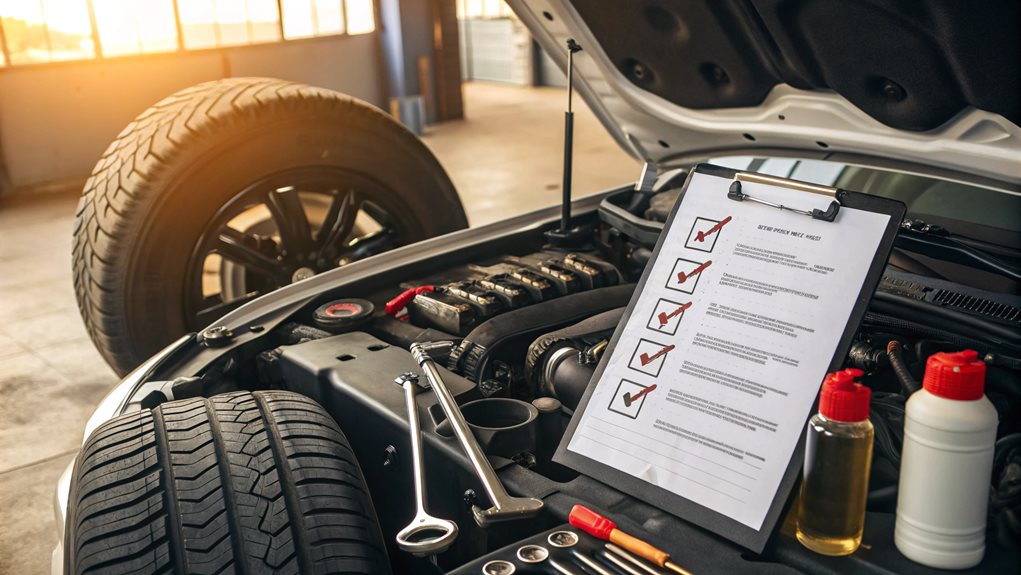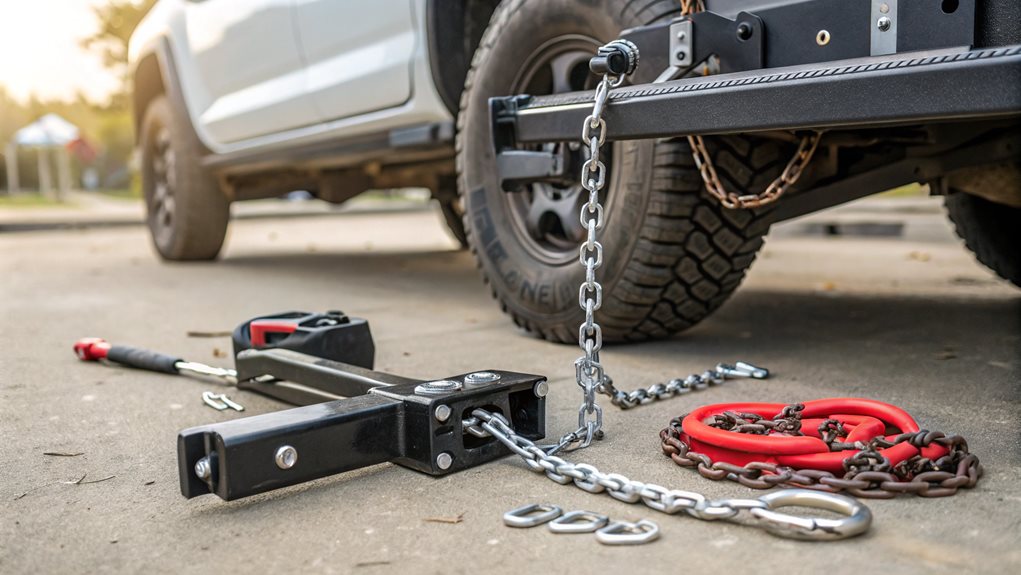Thorough vehicle preparation for towing begins with a meticulous inspection, evaluating tire conditions, suspension, axles, and the efficiency of brake systems, particularly those supporting trailers. All lights and signals should be operational, and essential fluids topped off to guarantee mechanical readiness. Personal belongings must be removed or secured to prevent interior damage, accompanied by documentation of the vehicle's condition. The hitching apparatus requires careful checking for proper installation and compatibility, while legal compliance demands verification of load distribution and brake system integrity. Thoughtful route planning and scheduled driving adjustments optimize the towing process, offering deeper insights as you explore further.
Expert Highlights
- Examine all tires for proper inflation, tread depth, and signs of wear or damage.
- Ensure all vehicle lights and signals are functional before starting the towing process.
- Verify the braking system, especially trailer brakes, for optimal performance.
- Remove valuables and secure any loose items within the vehicle to prevent shifting.
- Assess the hitching apparatus for secure mounting and compatibility with the trailer.
Vehicle Inspection and Maintenance

Conducting a thorough vehicle inspection is an indispensable step in guaranteeing safe and efficient towing operations. Begin by examining the tires on both the tow vehicle and trailer to confirm proper inflation and adequate tread. Assess each for wear, cracks, or punctures. Inspecting the suspension and axles for any signs of damage or wear ensures that the vehicle remains stable under load and can handle the additional weight of the trailer. Make sure that all lights and signals—brake, turn, and hazard—are functioning perfectly on both ends of the towing setup. Verify the vehicle's braking system, particularly if the trailer is equipped with its own brakes, for optimal performance and correct sensitivity adjustment. Ensuring secure and safe transport of your vehicle helps prevent damage, which means checking the tow equipment is just as crucial.
Top off essential fluids—engine oil, transmission, and brake fluid—in the tow vehicle while paying careful attention to the suspension and axles for damage or wear signs. Consider scheduling a pre-tow inspection with a rental company like U-Haul, as it helps identify any towing issues and ensures proper equipment is in place. Comprehensive inspections are imperative for ensuring reliability and safety in every towing endeavor.
Removing and Securing Items
Before gearing up for a towing operation, taking the time to remove and secure items within your vehicle can safeguard against potential damage and theft. It is prudent to extract all valuables, such as personal belongings or essential items, leaving nothing easily visible. Loose objects, like CDs, DVDs, and small electronics, should be cleared from seats to avert potential damage from shifting during the tow. For items that must remain in the vehicle, securing them in the trunk provides an added layer of safety. Additionally, ensuring that all doors are unlocked allows easier access for the tow truck driver and prevents potential damage from forced entry. Reliable roadside assistance providers like those in Minneapolis-St. Paul offer additional services such as gas delivery and lockout services to aid drivers in need. Proper preparation can increase the efficiency of the towing process, ensuring a smoother and safer transport. Furthermore, ensuring that all windows, doors, and the trunk are tightly closed can shield the interior from adverse weather and curious onlookers. Document the condition of your vehicle's interior prior to towing with photos or videos, establishing a baseline for post-tow inspection.
Towing Equipment Preparation

Preparing your towing equipment is paramount to ensuring a safe and successful towing operation. It begins with regular preventative maintenance on the tow vehicle and trailer to minimize breakdowns and potential hazards. Connection readiness involves checking the hitching apparatus meticulously, ensuring proper mounting of the receiver, and verifying the compatibility and firm seating of the hitch ball and coupler. Consistent inspection as part of routine inspections can reduce dangers from wear and tear, ensuring safety for the operator and other road users. Inspections extend to examining tires for adequate tread depth and any wear or damage, which supports safe maneuverability. Proper inflation, wheel balancing, and safe fastening of lug nuts prevent complications. Additionally, evaluating the brakes and suspension, including brake pad condition, brake controller settings, and suspension components, confirms that the braking system delivers reliable performance, safeguarding a smooth towing experience. A proactive approach to maintenance including eco-friendly practices can further ensure the longevity and safety of your towing equipment.
Safety and Legal Checks
Guaranteeing compliance with safety and legal standards is a crucial component of a secure towing endeavor. Proper vehicle upkeep and capability checks serve as a foundation for this process. Regular preventative maintenance guarantees the tow vehicle's readiness, while affirming adequate power, fuel, and properly inflated tires further reinforces dependability. Lighting and electrical systems require stringent assessments—both the tow vehicle and trailer lights must be fully operational, with wiring ideally arranged to avoid road contact. Professional roadside assistance can be valuable as changing a flat tire can be dangerous, and improper handling may lead to expensive repairs and accidents, emphasizing the importance of having trained technicians that are careful, especially on highways. Additionally, the brake system's integrity cannot be overlooked; ensuring operational brakes and correctly set brake controllers solidifies safety. Load distribution and balance must adhere to manufacturer guidelines, maintaining a low center of gravity to mitigate risks. These elements collectively secure towing's safety and legality.
Route Planning and Driving Adjustments

When planning a towing journey, strategic route planning and prudent driving adjustments are essential to guarantee a smooth trip. Begin by investing in a specialized GPS unit that accommodates the trailer's unique dimensions, ensuring access to roads that support its height, width, and weight. By utilizing a device capable of real-time traffic updates and multiple waypoints, drivers can remain informed and adaptable. Consider services that provide emergency roadside assistance, particularly those that include lockout services for additional security during your towing journey. Complement these tools with manual route modifications using Google Maps, tailoring paths to circumvent unsuitable roads or integrate necessary stops. Additionally, establish a driving schedule mindful of fatigue, visibility, and weather conditions, allocating time for regular breaks. Prioritize the maintenance of the tow vehicle and trailer, ensuring roadworthiness, and recalibrate routes to address the increased load and any reduced range.
Roadside Assistance FAQ
How Can I Calculate the Towing Capacity of My Vehicle?
To calculate your vehicle's towing capacity, subtract the sum of the curb weight and payload from the Gross Combined Weight Rating (GCVWR). Guarantee compliance with safety guidelines by not exceeding 90% of this calculated figure.
What Is the Cost of Professional Towing Services?
The cost of professional towing services varies based on base fees ($35-$100), per-mile charges ($2-$7), and additional fees. Costs escalate for specialized services, longer distances, or difficult conditions, emphasizing the importance of understanding potential expenses.
Are There Any Weight Limits When Towing With a Compact Car?
Compact cars generally have a towing capacity under 2,000 pounds, which includes the weight of passengers, cargo, and the trailer. Always consult your vehicle's manual to ascertain compliance with its specific towing and Gross Vehicle Weight Ratings (GVWR).
What Insurance Coverage Is Needed for Towing a Vehicle?
To guarantee adequate protection when towing a vehicle, all-encompassing liability insurance is essential, including coverage specifically for on-hook towing and motor truck cargo. Additionally, consider uninsured motorist and physical damage protection to safeguard against unforeseen incidents.
Can I Tow My Vehicle Myself or Should I Hire a Professional?
Determining whether to tow your vehicle yourself or hire a professional depends on your expertise, the equipment available, and confidence in ensuring safety. Self-towing requires meticulous preparation, while professionals offer convenience and experience mitigating risks.
